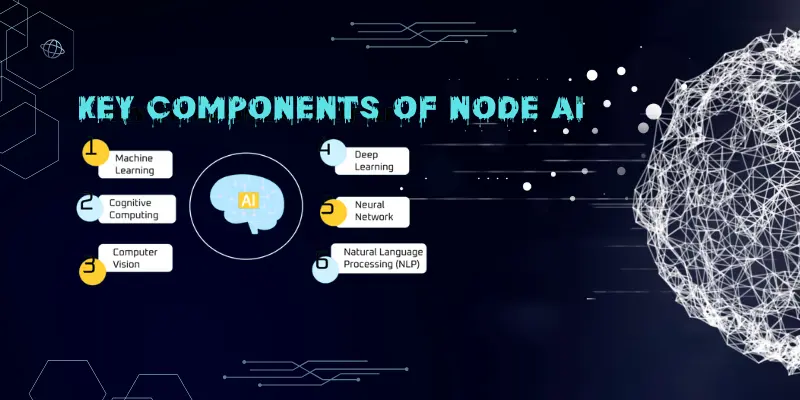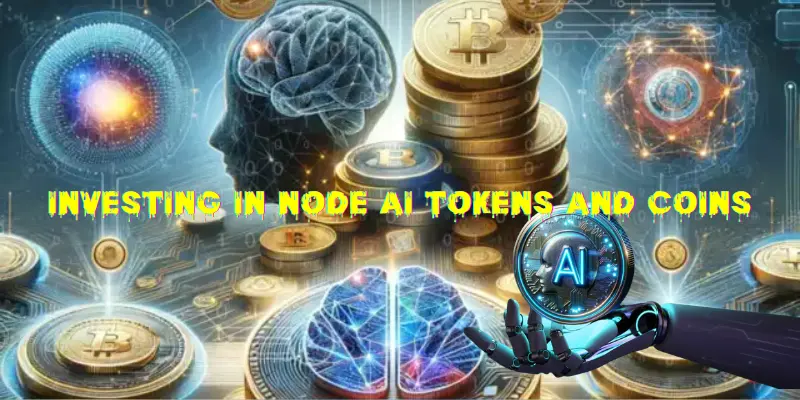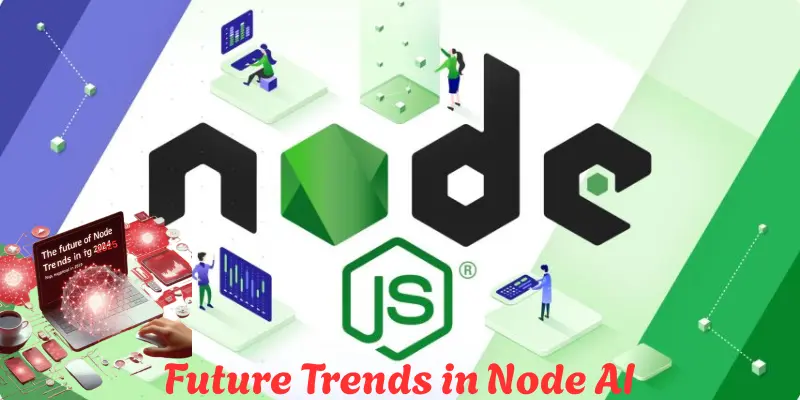Node Artificial Intelligence – Revolutionizing AI Networks
Published: 11/04/2025
Smart computers are changing how things work. They can think, learn, and solve problems. This smart power is called Artificial Intelligence, or AI. To make AI faster and stronger, special computer points called nodes are used. This is known as Node Artificial Intelligence.
With help from powerful parts like GPUs, Node AI is now used in crypto, apps, and smart tools. It helps people build better systems and find new ways to earn and grow with technology.
Table of Contents
Key Components of Node AI
Node AI is powered by essential components like AI nodes, GPUs, data flow, and machine learning models, working together to enhance AI performance. Here are some components.

- AI Nodes
- Small, smart points that work together to process data and make AI faster.
- GPUs
- Powerful processors that help AI nodes handle large tasks quickly, especially in graphics and data-heavy operations.
- Data Flow
- AI nodes rely on the smooth flow of data between them to make decisions and solve problems.
- Machine Learning Models
- Algorithms used in Node AI to help systems learn from data and improve over time.
- Distributed Computing
- The use of multiple nodes working together to solve bigger problems faster.
Applications of Node AI in Cryptocurrency
Node AI is transforming cryptocurrency by enhancing mining, improving blockchain security, and optimizing decentralized finance applications.

- Enhanced Mining
- Node AI helps optimize the process of crypto mining by using GPUs, making it faster and more efficient.
- Smart Contracts
- AI nodes can automate transactions and execute smart contracts in cryptocurrency networks, ensuring trust and reducing human errors.
- Blockchain Security
- Node AI enhances blockchain security by detecting fraudulent activities and protecting against hacks.
- Decentralized Finance (DeFi)
- AI nodes support DeFi applications, improving decision-making in areas like lending, borrowing, and asset management.
- Crypto Trading
- AI nodes help in analyzing market data, predicting price trends, and executing trades at the right time for better profits.
Renting and Leasing GPU Nodes
Renting and leasing GPU nodes offer an affordable and flexible solution for accessing powerful AI and cryptocurrency processing capabilities without owning expensive hardware.
What is GPU Node Rental?
- Renting GPU nodes allows businesses or individuals to access powerful computing resources without owning the hardware, making high-performance AI tasks more affordable.
- Cost-Effective Solution: Renting GPU nodes is cheaper than buying expensive hardware, especially for projects that require temporary use of AI power.
- Flexibility: Leasing GPU nodes offers flexibility to scale up or down based on your needs, helping you avoid over-investing in unused resources.
- Easy Access to High Performance: With GPU node rental services, you get access to top-tier GPUs that are essential for tasks like AI training, cryptocurrency mining, and machine learning without the upfront costs.
- Renting for AI Development: Developers can rent GPU nodes for creating and testing AI models, saving time and money while leveraging powerful computing power.
- Secure and Reliable: Many GPU rental platforms offer secure and reliable services, ensuring your data and tasks are handled efficiently.
Investing in Node AI Tokens and Coins
Investing in Node AI tokens and coins offers an opportunity to tap into the growth of decentralized AI networks and blockchain-powered technologies.

- What Are Node AI Tokens and Coins?
- These are digital currencies linked to the performance and growth of Node AI systems. Investors buy these tokens to support and benefit from the success of Node AI technologies.
- Potential for Growth
- As Node AI becomes more integrated into industries like cryptocurrency and machine learning, its tokens and coins have the potential for significant value increases.
- Access to AI Networks
- By owning Node AI tokens, investors can participate in decentralized networks, unlocking various benefits like transaction fees, staking rewards, or even governance rights.
- Diversification in Crypto Portfolio
- Investing in Node AI tokens is a great way to diversify your cryptocurrency investments, as it taps into the growing AI and blockchain markets.
- Risks and Rewards
- Like any investment, Node AI tokens come with risks, but they also offer the chance for high rewards as the technology develops and becomes more mainstream.
- How to Invest
- Investors can buy Node AI tokens through various cryptocurrency exchanges or directly from projects that are developing AI-powered networks.
Setting Up Your Own AI Node
Setting up your own AI node allows you to harness the power of decentralized computing for efficient data processing and AI model development.
- Why Set Up an AI Node?
- Running your own AI node allows you to process data, train machine learning models, and contribute to decentralized networks, all while gaining control over your AI projects.
- Choosing the Right Hardware
- The first step in setting up an AI node is selecting powerful hardware. You’ll need a strong CPU, sufficient RAM, and most importantly, a high-performance GPU for tasks like data processing and model training.
- Installing Necessary Software
- Install the right operating system (like Linux or Windows) and AI software tools. You’ll also need machine learning libraries like TensorFlow or PyTorch, and frameworks like Node.js if you’re using Node AI.
- Configuring the Node
- Once the hardware and software are set up, configure your AI node to work with a network. This might involve setting up APIs, connecting to a blockchain for decentralized work, or configuring cloud services for remote access.
- Training and Testing
- After setting up, you can start training AI models on your node. Run tests to ensure that your node is performing optimally, and make adjustments to enhance processing power if needed.
- Security and Maintenance
- Ensure your AI node is secure from cyber threats. Regularly update the software, check for vulnerabilities, and monitor performance to keep everything running smoothly.
- Scaling Your Node
- If your AI node starts to outgrow its resources, consider scaling up. You can add more GPUs, increase storage capacity, or even connect with other nodes to improve performance.
Future Trends in Node AI
The future of Node AI holds exciting advancements in decentralized networks, faster processing, and applications across industries like crypto and machine learning.

- Integration with 5G
- As 5G networks expand, Node AI will become even faster and more efficient. The ultra-low latency of 5G will allow AI nodes to process data in real-time, enhancing applications in smart cities, autonomous vehicles, and IoT.
- Decentralized AI Networks
- In the future, more Node AI systems will be decentralized. This means AI processing and decision-making will happen across multiple nodes rather than relying on a single central server, improving security and scalability.
- AI in Edge Computing
- Node AI will play a key role in edge computing, where data is processed closer to the source rather than in a distant cloud. This trend will speed up AI applications like real-time facial recognition, voice assistants, and medical monitoring.
- Improved GPU Capabilities
- As GPUs continue to evolve, AI nodes will benefit from faster, more powerful hardware, allowing them to tackle even more complex tasks like deep learning and predictive analytics with greater speed and accuracy.
- AI-powered Smart Contracts
- Future Node AI systems will increasingly be used to run and execute smart contracts in decentralized finance (DeFi) platforms. This will automate decision-making and enhance trust in digital transactions.
- Energy-Efficient AI
- As the demand for AI increases, there will be a push toward more energy-efficient AI nodes. New technologies and hardware will reduce the environmental impact of AI processes while maintaining high performance.
- AI for Autonomous Systems
- Node AI will be crucial for the growth of autonomous technologies like self-driving cars, drones, and robots. These systems will rely on real-time data from multiple AI nodes to make quick, accurate decisions without human intervention.
Advantages and Disadvantages of Node Artificial Intelligence
Node AI offers powerful benefits like increased efficiency and scalability, but it also comes with challenges such as high energy consumption and setup complexity.
Benefits of Node Artificial Intelligence
Node AI offers improved efficiency, scalability, and cost-effectiveness, making it a powerful tool for various AI-driven applications.
| Pros |
|---|
|
Drawbacks of Node Artificial Intelligence
While Node AI offers many advantages, it also comes with challenges such as high energy consumption, complex setup, and security concerns.
| Cons |
|---|
|
Common FAQs About Node Artificial Intelligence
Here are answers to some of the most frequently asked questions about Node AI, its benefits, and applications.
Node AI refers to decentralized points (nodes) in a network that process data and support artificial intelligence tasks, like machine learning and data analysis.
By using multiple nodes to share the workload, Node AI can handle large amounts of data faster, improving overall efficiency and speed.
Absolutely! Node AI plays a key role in crypto mining, improving speed and accuracy for blockchain-based tasks.
For effective Node AI performance, you’ll need a powerful GPU, sufficient RAM, and a good CPU to handle heavy data processing.
While decentralized networks offer security benefits, proper setup and maintenance are essential to prevent cyber threats.
Yes, Node AI is perfect for machine learning tasks as it can process large datasets and support the training of complex models efficiently.
Conclusion
Node AI is transforming the way we use artificial intelligence by offering faster, more efficient solutions. Whether it’s for machine learning, cryptocurrency mining, or smart applications, Node AI brings power and flexibility.
With advancements in GPU technology and the rise of decentralized networks, the future of Node AI looks promising. While there are challenges like setup complexity and energy consumption, the benefits it offers make it a key player in the world of AI. As this technology grows, more opportunities will arise for businesses and individuals to explore its potential and take advantage of its capabilities.

- Be Respectful
- Stay Relevant
- Stay Positive
- True Feedback
- Encourage Discussion
- Avoid Spamming
- No Fake News
- Don't Copy-Paste
- No Personal Attacks

- Be Respectful
- Stay Relevant
- Stay Positive
- True Feedback
- Encourage Discussion
- Avoid Spamming
- No Fake News
- Don't Copy-Paste
- No Personal Attacks





